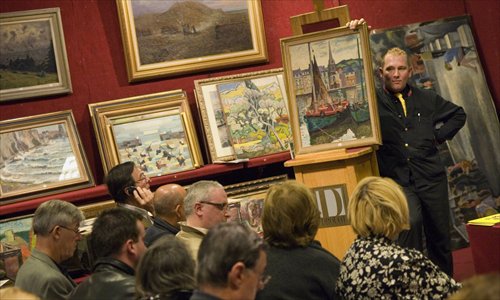HOME >> LIFE, METRO BEIJING
The art of WeChat
By Global Times-Agencies Source:Global Times Published: 2014-7-14 19:13:01

WeChat opens up online art auctions. Photo: IC
The social network platform WeChat has become the latest tool in the bidding wars of the art world. The marketing of artworks via the network has opened up art collection circles to new customers.The past few months have witnessed the establishment of a number of WeChat auction accounts, including Weekly Auction, and Rose Auction, and auction groups such as Yimai WeChat Auction and Ate Jiefu Day & Night Auction. Most of the collections up for auction are paintings, calligraphies, photography and other works from domestic contemporary artists. The price of some of these artworks can cost tens of thousands yuan.
In the Ate Jiefu Day & Night Auction group, collections were sold at the average price of 3,000 yuan ($484), according to Hu Hu, who found the group in February and believes "people in art circles have a higher attachment to WeChat compared to other social network tools such as QQ. This is what makes WeChat an ideal platform for art trade."
Customers are drawn to WeChat group auctions because they are easy to reach. All the procedures can be made by a smart phone, in which you can bid in the group conversation and pay the price online. In order to attract more potential buyers, Hu also sets the starting price of some pieces lower than the market price.
"Most of the bidders are novice collectors but have previous experience in the art industry. They understand art and the collection market, but will not go to an offline auction," said Xia Yanguo, an art curator.
Zhu Xiaojun, executive director of an art foundation, bought several items that included paintings by young Chinese artists on WeChat. "It is more like a recreational game played by people in art circles. The pieces sold via WeChat are more like consumer goods [rather than collections]," said Zhu.
Art trade companies have also taken notice of the potential in the WeChat market. Weekly Auction, the public account of culcn.cn, a website specializing in promoting online trade of cultural products, has launched 19 weekly auctions on WeChat since February of this year.
Its latest auction events during June 29 and July 13, featured 70 Chinese paintings and calligraphy works from contemporary artists including Song Juting, Kanyu Min and Du Zhongliang.
In Weekly Auction, auctions can be easily joined by followers who send their name, contact details and a bidding price to the public account. Alternatively, auctioneers can be contacted directly by phone or text message.
All auctions in Weekly Auction have unlimited price tags on their pieces. Therefore, the price of an item is raised by 100 yuan with each bid until a deal is clinched at the highest price, or a negotiation between the buyer and the auctioneer is agreed.
However, an important question of any WeChat auction is how can buyers know whether the artworks are authentic or fake.
In the latest auction, Weekly Auction declared that all their collections come with a certificate. According to a report by the Shanghai-based newspaper Youth Daily in May, certificates are given to items that the auction organizers collect directly from the artists themselves.
Despite this, in other auctions there are numerous reports that items provided by some Web users are without such certificates. Sometimes items are directly delivered to buyers without supervision from auction organizers, which increases the risk of buying fake artworks.
"The law has strict regulations on the those who conduct auctions. However, it's hard to supervise on WeChat," said Zhang Yuanjie, a professor of economic law, during an interview with the Shanxi Business News.
But in Hu Hu's opinion, the authenticity of collection poses no problem in WeChat auctions, "Because there has been so few counterfeit works in the contemporary art field."
It is still unclear how much of an impact WeChat will have on the art industry. "It still only accounts for a small amount of the art trade industry," said Cheng Xindong, an art curator and art broker.
Posted in: Relationships, Intel